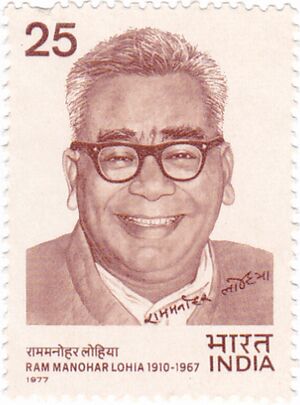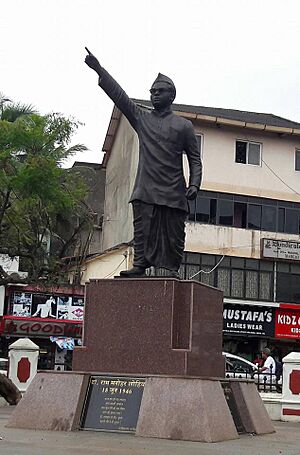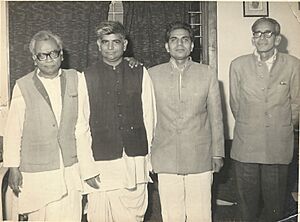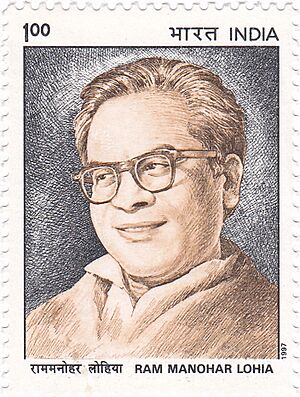Ram Manohar Lohia facts for kids
Quick facts for kids
Ram Manohar Lohia
|
|
|---|---|

Lohia on a 1977 stamp of India
|
|
| Born | 23 March 1910 Akbarpur, United Provinces of Agra and Oudh, British India
|
| Died | 12 October 1967 (aged 57) New Delhi, India
|
| Alma mater | |
| Political party |
|
| Movement | |
Ram Manohar Lohia (born March 23, 1910 – died October 12, 1967) was a brave leader who fought for India's freedom from British rule. He was also a socialist politician. This means he believed in fairness and equality for everyone. During the time when the British still ruled India, he secretly worked for a radio station called Congress Radio. This station broadcasted important messages from hidden places in Mumbai until 1942.
Early Life
Ram Manohar Lohia was born on March 23, 1910, in a family from Akbarpur. This place is now in Uttar Pradesh. His mother passed away when he was only two years old. His father, Hiralal, raised him after that and never remarried. A kind lady who worked for the family also helped care for him when he was very young.
In 1918, he moved to Mumbai with his father. He finished his high school education there. He then went to Banaras Hindu University and later to Vidyasagar College in Calcutta. In 1929, he earned his Bachelor of Arts degree.
Lohia decided to study in Germany at Frederick William University. This university is now called Humboldt University of Berlin. He chose it over universities in Britain. He wanted to show his dislike for British ideas. He quickly learned German. He also received money to help with his studies because he was a very good student. From 1929 to 1933, he studied national economy for his PhD. His PhD paper was about Salt Taxation in India. It focused on Gandhi's ideas about society and money.
Fighting for Freedom

Lohia helped start the Congress Socialist Party. He was also the editor of its newspaper, Congress Socialist. In 1936, Jawaharlal Nehru chose him to be the secretary of the Foreign Department. This was for the All India Congress Committee, which was the main group of the Congress Party.
By 1938, Lohia started to form his own political ideas. He looked closely at the views of Gandhi and other leaders. In June 1940, he was arrested. He was sent to jail for two years because he gave speeches against the war. He was released by the end of 1941.
Lohia then became a key leader in secretly organizing the Quit India revolt. Gandhi started this movement in August 1942. Lohia was caught in May 1944. He was put in jail and tortured in Lahore Fort. He was one of the last important prisoners. Lohia and Jayaprakash Narayan were finally set free on April 11, 1946. He was the person who came up with the idea of sapta kranti, meaning seven revolutions.
Later Political Work
Lohia was a member of the Congress Socialist Party. When this party left the main Congress, he went with them. He stayed with the Socialist Party when it joined with another party in 1952. They formed the Praja Socialist Party. But Lohia was not happy with this new party. So, in 1956, he led a group to form the Socialist Party (Lohia) again.
He ran against Nehru in the 1962 election but lost. In 1963, Lohia became a member of the Lok Sabha. This is like being a member of parliament. He won a special election in Farrukhabad (Lok Sabha constituency). In 1965, he merged his Socialist Party (Lohia) into the Samyukta Socialist Party. The two socialist groups joined, split, and rejoined many times.
In 1967, Lohia helped create the first government in Uttar Pradesh that was not from the Congress party. This group was formed by Lohia and another leader, Nanaji Deshmukh. He won the Lok Sabha election in 1967 from Kannauj (Lok Sabha constituency). Sadly, he passed away a few months later.
Memorials
Many places are named after Ram Manohar Lohia to remember him:
- Avadh University in Faizabad was renamed "Dr. Ram Manohar Lohia Avadh University".
- The Dr. Ram Manohar Lohiya National Law University in Lucknow is named after him. It is one of India's best law schools.
- 18th June Road in Panjim, Goa, is named after him. On that date in 1946, he started a protest against British rule there.
- The Willingdon Hospital in New Delhi was renamed Ram Manohar Lohia Hospital in the 1970s. Ram Manohar Lohia died in this hospital after a surgery.
- Dr. Ram Manohar Lohia Institute of Medical Sciences is a medical school in Lucknow.
- Dr. Ram Manohar Lohiya Bhawan is a community hall in his hometown of Akbarpur, Ambedkar Nagar. It is the only memorial there in his name.
See also
- Jagdeo Prasad
 | Valerie Thomas |
 | Frederick McKinley Jones |
 | George Edward Alcorn Jr. |
 | Thomas Mensah |



